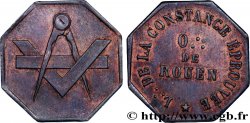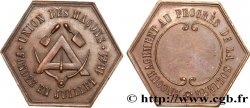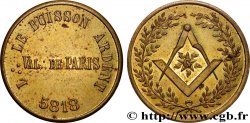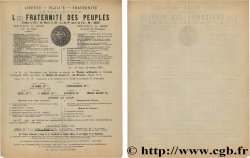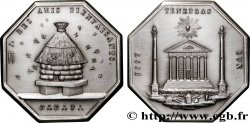fjt_533582 - FREEMASONRY Albert Pike & Henry C. Clausen, Souverain Grand CommAndeur, 9° Grado Maestro Eletto Dei Nove - “L’Elu des Neuf”���� n.d.
70.00 €(Approx. 81.90$ | 60.20£)
Quantity
Add to your cart

Type : Albert Pike & Henry C. Clausen, Souverain Grand CommAndeur, 9° Grado Maestro Eletto Dei Nove - “L’Elu des Neuf”����
Date: n.d.
Metal : bronze
Diameter : 40 mm
Orientation dies : 12 h.
Weight : 44 g.
Edge : Lisse
Catalogue references :
Predigree :
Exemplaire provenant de la Collection JCT
Obverse
Obverse legend : ALBERT PIKE :. HENRY C. CLAUSEN :. SOVEREIGN GRAND COMMANDERS :. SIGNÉ O. PICCIONE.
Obverse description : Portraits face gauche de Henry Clausen et Albert Pike arborants leurs sautoirs et décors.
Reverse
Reverse legend : MORALS DOGMA AND CLAUSEN‘S / COMMENTAIRIES :. 1983 :. / 9° GRADO MAESTRO ELETTO DEI NOVE.
Reverse description : Plein champ sur peau de cuir striée, blason représentant le Grade d’Elu Secret. Poignard dans
main droite, gouttes de sang, surmonté d’une étoile flamboyante.
Commentary
Albert Pike, 1809-1891. Né à Boston en 1809 (annus mirabilis qui donna au monde lincoln, Gladstone, Darwin, Poe, tennyson, etc...) ; refusé par Harvard University (sans droit d’inscription), il partit sur le territoire d’Arkansas, y vécu parmi les Peaux-Rouges dont il parla la langue, enseigna dans une école isolée
dans les bois, fit son droit, fut recu avocat, entra à l’Armée des Confédérés (pour cette raison, on l’appela “général”), s’installa à Little Rock, puis se déplaca à Washington, ou il vécu dans la Maison du Temple jusqu’a sa mort en 1891 (quand cette “House oh the Temple” fut reconstruite, elle devint un monument à
Pike).
Source : Dictionnaire de la Franc-Maçonnerie Daniel Ligou.
Albert Pike, 1809-1891. Born in Boston in 1809 (annus mirabilis which gave the world Lincoln, Gladstone, Darwin, Poe, Tennyson, etc.); rejected by Harvard University (without tuition), he went to the territory of Arkansas, lived there among the Indians whose language he spoke, taught in an isolated school in the woods, studied law, was admitted to the bar, entered the Confederate Army (for this reason, he was called “general”), settled in Little Rock, then moved to Washington, where he lived in the House of the Temple until his death in 1891 (when this “House of the Temple” was rebuilt, it became a monument to Pike). Source: Dictionary of Freemasonry Daniel Ligou
dans les bois, fit son droit, fut recu avocat, entra à l’Armée des Confédérés (pour cette raison, on l’appela “général”), s’installa à Little Rock, puis se déplaca à Washington, ou il vécu dans la Maison du Temple jusqu’a sa mort en 1891 (quand cette “House oh the Temple” fut reconstruite, elle devint un monument à
Pike).
Source : Dictionnaire de la Franc-Maçonnerie Daniel Ligou.
Albert Pike, 1809-1891. Born in Boston in 1809 (annus mirabilis which gave the world Lincoln, Gladstone, Darwin, Poe, Tennyson, etc.); rejected by Harvard University (without tuition), he went to the territory of Arkansas, lived there among the Indians whose language he spoke, taught in an isolated school in the woods, studied law, was admitted to the bar, entered the Confederate Army (for this reason, he was called “general”), settled in Little Rock, then moved to Washington, where he lived in the House of the Temple until his death in 1891 (when this “House of the Temple” was rebuilt, it became a monument to Pike). Source: Dictionary of Freemasonry Daniel Ligou







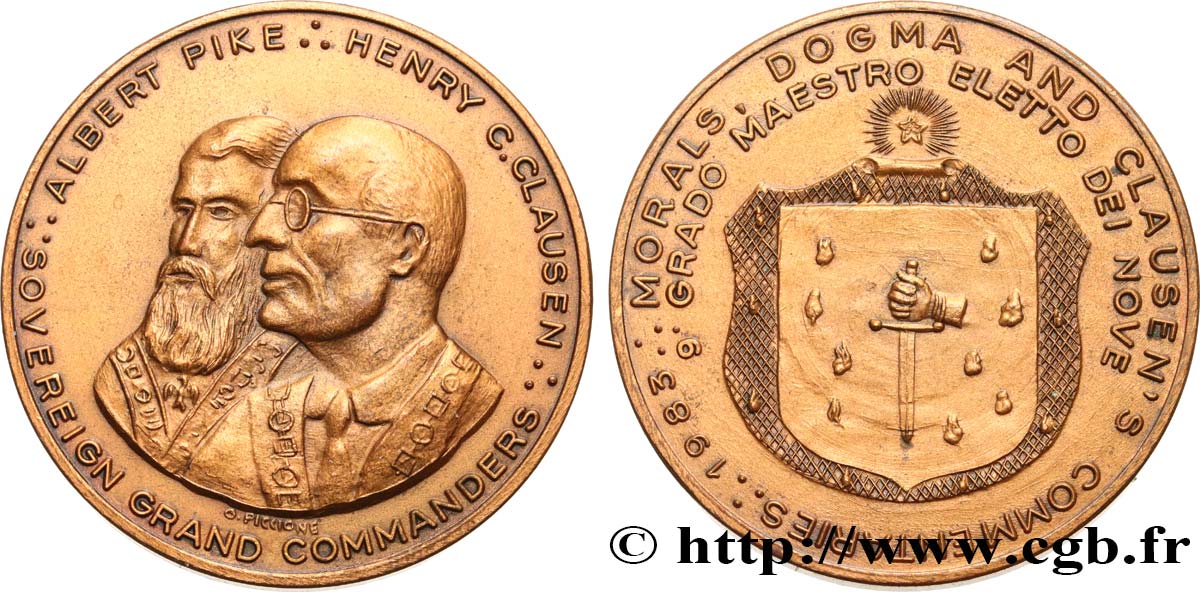
 Report a mistake
Report a mistake Print the page
Print the page Share my selection
Share my selection Ask a question
Ask a question Consign / sell
Consign / sell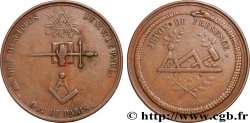
 Full data
Full data